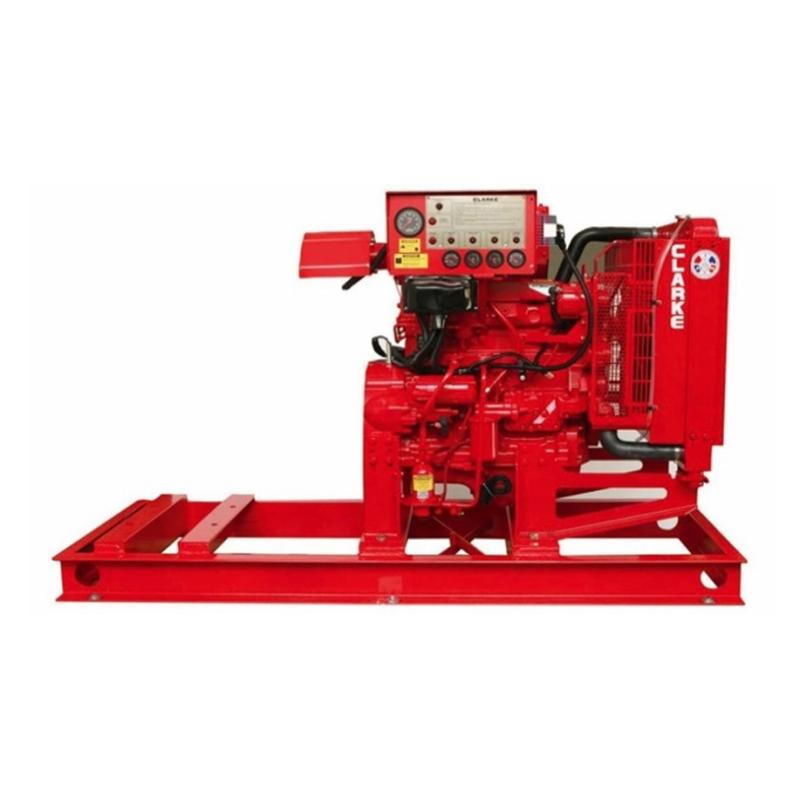Engine
Comprehensive engine solutions tailored to your industry.

Fire Pump Diesel Engine
A diesel engine used as a driver for a fixed fire pump is a critical component in fire protection systems. It serves as a reliable power source to operate the fire pump, especially in situations where electrical power may be unavailable or unreliable during a fire emergency. Diesel engines are commonly used in fire pump systems due to their durability, independence from external power sources, and ability to provide consistent performance under demanding conditions.
Key Features of Diesel Engines for Fixed Fire Pumps
1. Independence from Electrical Power:
- Diesel engines do not rely on external electrical power, making them ideal for fire protection systems where power outages may occur during emergencies.
- They are self-contained and use their own fuel supply to operate.
2. High Reliability:
- Diesel engines are designed to start quickly and operate reliably under extreme conditions.
- They are built to meet stringent standards, such as **NFPA 20**, to ensure they can perform when needed.
3. Robust Construction:
- Diesel engines for fire pumps are built to withstand harsh environments and continuous operation.
- They are often equipped with heavy-duty components to ensure long-term reliability.
4. Fuel Storage:
- Diesel engines require an on-site fuel storage tank with sufficient capacity to run the engine for a specified duration (typically 8 hours or more, as required by NFPA 20).
5. Cooling Systems:
- Diesel engines are equipped with cooling systems (air-cooled or liquid-cooled) to prevent overheating during operation.
6. Starting Systems:
- Diesel engines for fire pumps typically have multiple starting methods, such as electric starters (battery-powered) and manual backup systems (e.g., hand cranking).
7. Control and Monitoring:
- Diesel engines are integrated with control panels that monitor engine performance, including oil pressure, coolant temperature, and battery status.
- They are designed to start automatically when the fire pump system is activated.
---
Requirements for Diesel Engines in NFPA 20
NFPA 20 sets specific requirements for diesel engines used in fixed fire pump systems to ensure their reliability and performance. Key requirements include:
1. Fuel Supply:
- The fuel tank must have sufficient capacity to run the engine at full load for at least 8 hours.
- The fuel supply must be located and protected to prevent contamination or damage.
2. Starting Systems:
- Diesel engines must have at least two independent starting methods (e.g., electric starter and manual backup).
- Batteries for electric starters must be maintained and tested regularly.
3. Cooling Systems:
- Engines must have adequate cooling systems to prevent overheating during operation.
- Liquid-cooled engines must have a heat exchanger or other means to dissipate heat.
4. Performance Testing:
- Diesel engines must be tested regularly to ensure they can start and operate under full load conditions.
- Weekly and annual testing is required to verify performance.
5. Environmental Protection:
- Diesel engines must be installed in a protected environment to prevent damage from fire, flooding, or other hazards.
- The engine room must have proper ventilation to remove exhaust gases and provide fresh air for combustion.
6. Exhaust Systems:
- Exhaust systems must be designed to safely discharge gases away from the building and any air intake systems.
- Exhaust pipes must be insulated to prevent heat damage to surrounding materials.
7. Control Panels:
- Diesel engines must be equipped with a dedicated control panel that monitors engine parameters and provides alarms for issues such as low oil pressure, high coolant temperature, or failure to start.
---
Advantages of Diesel Engines for Fixed Fire Pumps
1. Reliability: Diesel engines are highly reliable and can operate independently of external power sources.
2. Durability: They are built to withstand harsh conditions and continuous operation.
3. High Torque: Diesel engines provide the necessary torque to drive fire pumps at high pressures and flow rates.
4. Long Operational Time: With proper fuel storage, diesel engines can operate for extended periods.
---
Applications of Diesel-Driven Fire Pumps
Diesel engines are commonly used in fire pump systems for:
- High-rise buildings.
- Industrial & Oil Gas facilities.
- Warehouses.
- Hospitals.
- Airports.
- Any facility where a reliable fire protection system is critical.
---
Maintenance of Diesel Engines for Fire Pumps
Regular maintenance is essential to ensure the reliability of diesel engines. Key maintenance tasks include:
1. Weekly Testing: Start the engine and run it for a short period to ensure it operates correctly.
2. Annual Testing: Perform a full-load test to verify the engine's performance under operational conditions.
3. Fuel Management: Regularly check and replace fuel to prevent degradation or contamination.
4. Battery Maintenance: Ensure batteries are charged and in good condition.
5. Cooling System Checks: Inspect and maintain the cooling system to prevent overheating.
By adhering to NFPA 20 standards and maintaining the diesel engine properly, facilities can ensure that their fire pump system will function effectively in an emergency, providing critical water supply for fire protection.
Sorry, no products were found
PT Renjana Multi Sinergi
Jl. Pemda Tigaraksa No.5,
Komplek Pergudangan Bizlink Citra Raya Blok O8 /20,
Sukamulya, Kec. Cikupa,Tangerang 15710, Banten.
Indonesia